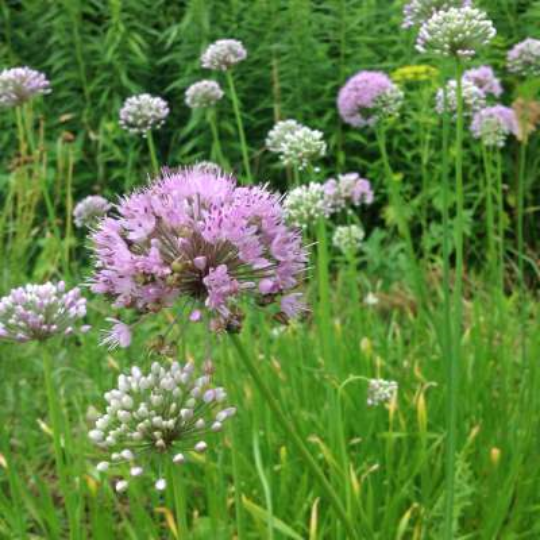Carolina Garlic (Allium carolinianum)
| Plant type: Perennial |
| Flower color: Violet |
| Quantity: Envelope of about 25 seeds |
| Exposure: Full sun |
| Soil: All types of soils |
| Watering: If needed |
| Days to maturity: 2 years |
| Germination: 5 to 10 days |
| Plant spacing: 15 cm |
| Row spacing: 20 cm |
| Depth: 5 mm |
| Width: 15 cm to 20 cm |
| Height: 30 cm |
| Color: Green |
| Family: Amaryllidaceae |
A friend gave us some seeds of this plant which he claimed was called Carolina Garlic. We do not know the exact identity of this plant, but we are currently researching it. It is a small perennial and hardy plant in Quebec, which looks like garlic chives, but is not! Its stems and leaves are a little larger, taste the same delicious as regular garlic and cook the same way. Although it does not produce large underground bulbs, the white base of this plant is cut and eaten like garlic, along with its leaves. Its purple flowers are magnificent and are a delight for pollinators from July to the end of August. Perfect in the permaculture garden. Not to be confused with garlic or wild garlic or wild garlic. Growing Tips Sow seeds indoors in April. Then take out the seedlings when temperatures permit. Each seed must be separated from its peers to produce a plant. Let it grow for the first year without eating. The second year, the sowing will have given a crown of small pods attached to each other. Stick your shovel into the tiller, then remove the half which you will eat. The other half can stay in the ground and survive the winter. You can also take the opportunity to separate the small bulbs and replant them immediately in another location, in order to encourage the formation of a tiller in the following year.
RETURN AND EXCHANGE
For the return of a purchased product: if you are not satisfied with your product or if you think there is an error in your order, do not hesitate to contact us at any time by email.

